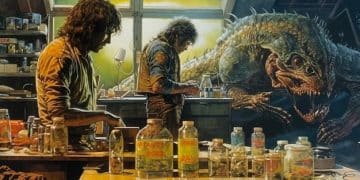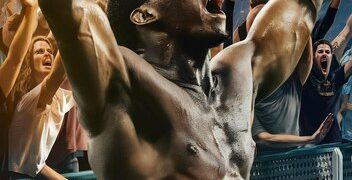The Boys Season 4: Will Homelander Face Supe Rebellion? Fan Theories Analyzed

The prospect of a supe rebellion against Homelander in The Boys season 4 is a hotly debated topic among fans, with compelling theories suggesting various powerful characters and factions could orchestrate such an uprising, profoundly impacting the series’ future narrative and Homelander’s ultimate fate.
As the highly anticipated fourth season of The Boys approaches, one question burns brighter than any other among fans: Will Homelander face a supe rebellion? The volatile landscape of Vought International and the ever-shifting allegiances among its super-powered roster strongly suggest this isn’t just a possibility, but a looming inevitability.
The Precarious Reign of Homelander: A Powder Keg Awaiting a Spark
Homelander’s increasingly unhinged behavior and public displays of unchecked power have made him a living embodiment of the collateral damage unchecked authority can wreak. His actions, from outright murder to psychological manipulation, have alienated former allies and created a climate of fear among those who might once have looked up to him. This narrative trajectory sets the stage for a dramatic confrontation, pushing various supes to their breaking point.
The very concept of a supe rebellion is tantalizing because it pits power against power in a way previously unseen on the show. While The Boys have always been a thorn in Vought’s side, a direct uprising from within the supe community itself would elevate the stakes to unprecedented levels. It redefines the power dynamics, suggesting that even the most formidable individuals can be challenged from unexpected quarters.
The Erosion of Loyalty: Homelander’s Growing Isolation
Homelander’s leadership style is less about inspiration and more about intimidation, a tactic that inherently breeds resentment. His treatment of fellow Vought assets often borders on abusive, leading to a deep-seated fear that could easily morph into defiance. This environment of apprehension is fertile ground for resistance to take root, as supes begin to question their allegiance to a leader who views them as disposable pawns rather than valuable colleagues.
Consider the cumulative effect of his brutal actions. Each murder, each verbal assault, each unpredictable tantrum chips away at the already thin veneer of respect he commands. For supes who value their own lives and autonomy, Homelander represents a ticking time bomb – a threat that must eventually be neutralized for their own safety and survival.
The Shifting Sands of Supe Allegiances
In a world where power dictates survival, allegiances are fluid. As Homelander’s control tightens, some supes might find it more advantageous, or indeed necessary, to align themselves with opposition forces. This could be driven by moral conviction, a desire for self-preservation, or simply a pragmatic recognition that Homelander’s reign is unsustainable in the long run. The series has already shown flashes of disquiet among Vought’s roster, hinting at a hidden undercurrent of dissent.
The potential for a supe rebellion is not just about a few powerful individuals but also about broader discontent. Smaller groups or even individual supes, disillusioned by Homelander’s tyranny, could become crucial cogs in a larger resistance movement. It represents a dramatic shift from the traditional hero-villain dynamic, introducing a complex internal conflict within the supe community.
Key Players and Their Potential Roles in a Supe Uprising
Identifying who might stand against Homelander is crucial to understanding the potential scope and impact of a supe rebellion. Several established characters and even new additions could play pivotal roles.
Queen Maeve: The Disgraced but Still Powerful
Though presumed dead by the public, Queen Maeve’s survival at the end of season three leaves her as a wild card. Her deep-seated hatred for Homelander and personal history of being manipulated by him make her a prime candidate to lead or at least significantly support a rebellion. Her power set and experience within the Seven give her a unique insight into Homelander’s weaknesses.
Maeve’s character arc has consistently shown her struggle with morality and her desire for redemption. A rebellion against Homelander would offer her the ultimate chance to atone for her past complicity and fight for genuine change. Her involvement could rally other disillusioned supes who once respected her or feared Homelander.
- Strategic Mind: Maeve possesses not just physical strength but also a strategic mind, having navigated Vought’s political landscape for years.
- Personal Vendetta: Her deeply personal grievances against Homelander provide strong motivation for her to act decisively.
- Symbol of Hope: For many supes and even the public, Maeve could represent a credible alternative to Homelander’s oppressive rule.
Starlight: The Moral Compass and Potential Unifier
Annie January, or Starlight, has consistently been an ethical anchor in a morally bankrupt world. Her growing disillusionment with Vought and open opposition to Homelander’s actions position her as a natural leader for any ethical supe resistance. While not as physically powerful as Homelander, her influence and moral authority could be invaluable in rallying support.
Starlight’s journey from naive newcomer to hardened activist makes her a compelling figure. She has seen the true face of Vought and Homelander, and her commitment to justice is unwavering. She could be the bridge between the Boys and any sympathetic supes, leveraging her public image to expose Vought’s atrocities even further.
Soldier Boy: A Reckless but Potentially Potent Ally
Soldier Boy’s fate at the end of season three is left ambiguous, making him a powerful, albeit risky, potential factor. His sheer destructive power and indifference to collateral damage could make him an unpredictable ally. While he despises Homelander, his own moral ambiguity means he’s not easily controlled. A supe rebellion might leverage his power as a blunt instrument, but his loyalty is tenuous.
The dynamic between Soldier Boy and Homelander is complex, rooted in a twisted family history. Soldier Boy’s raw power is almost unmatched, and his presence alone could tip the scales in a devastating conflict. However, his volatile nature and tendency towards self-interest make him a double-edged sword for any rebellion.

Black Noir (New): A Different Kind of Threat
With the original Black Noir gone, it’s highly probable Vought will introduce a new one. This new Black Noir could either be a loyal enforcer for Homelander or, interestingly, a disillusioned asset who becomes aware of Homelander’s true nature. A new Black Noir, especially one with a different personality or moral compass, could offer a fresh narrative avenue for internal conflict within Vought, playing a pivotal role depending on their allegiance.
The mystery surrounding the new Black Noir creates myriad possibilities. Will they be an unthinking drone, or a character with their own motivations and a potential for growth? Their actions could significantly impact the power dynamics of season four, potentially even siding against Homelander if their programming or allegiance shifts.
Fan Theories: Dissecting the Potential Outcomes and Scenarios
The beauty of The Boys lies in its unpredictability, and fan theories often try to piece together the puzzle of what’s to come. The idea of a supe rebellion has spawned numerous compelling hypotheses.
The “Internal Vought Uprising” Theory
This theory posits that the rebellion might not be a direct “good supes vs. bad supes” scenario, but rather a more nuanced internal power struggle within Vought itself. Certain board members, executives, or even mid-level supes might secretly conspire to remove Homelander due to his escalating erratic behavior, which poses a significant threat to Vought’s public image and profitability. Ashley Barrett, as a figure often caught between Homelander’s whims and corporate demands, could be instrumental, albeit reluctantly, in such a plot.
The corporate aspect of Vought is a constant presence in the show. Homelander’s recent actions, particularly his public laser-eye murder, have surely raised red flags for the more pragmatic, profit-oriented executives. They might view him as a liability rather than an asset, prompting them to seek his removal through more subtle or even overt means, potentially using other supes as their instruments.
The “Compound V Variants” Theory
A more complex theory suggests that Starlight, Maeve, or even The Boys might discover and weaponize different variants of Compound V, perhaps a version that temporarily depowers supes or makes them vulnerable to control. This would allow them to level the playing field against Homelander and other powerful antagonists, opening the door for non-superpowered individuals to play a more direct role in orchestrating a rebellion among less powerful but numerous supes. This approach shifts the reliance from raw power to strategic scientific exploitation.
- Weakening Extremes: A compound V variant could be designed to specifically neutralize Homelander’s more extreme powers, making him vulnerable.
- Creating Counter-forces: Such a variant might enable the creation of new supes, or modify existing ones, to specifically counter Homelander’s abilities.
- Strategic Leverage: This is a less direct, but potentially more effective, way to undermine Homelander’s perceived invincibility, turning the tables on Vought’s own weapon.
The “Sympathetic Supe Network” Theory
Some fans believe a clandestine network of sympathetic supes, long disillusioned by Homelander and Vought, has been operating in the shadows. This network, perhaps inspired by Starlight’s bravery or Maeve’s resistance, could finally emerge in season four to mount a collective challenge. This would involve lesser-known supes, or even new characters, joining forces to create a significant numerical advantage, overwhelming Homelander through sheer force of numbers and coordinated tactics, rather than relying on a single powerful individual.
This theory emphasizes the “everyman” supe who has suffered under Vought’s tyranny but lacked the courage or means to speak out. A network could provide the necessary support and protection for these supes to come forward, creating a grassroots movement that could ultimately challenge the established order directly. It’s a hopeful theory, suggesting that even in the darkest of places, there are those willing to fight for what’s right.
The Role of The Boys: Orchestrators or Catalysts?
While the focus is on a supe rebellion, The Boys themselves, particularly Billy Butcher, would undoubtedly play a crucial role. Their involvement could range from being the primary orchestrators, gathering and arming sympathetic supes, to being catalysts, providing critical intelligence or resources that incite the rebellion.
Butcher’s relentless pursuit of Homelander and his willingness to go to extreme lengths make him a key figure. If a supe rebellion is to occur, Butcher will likely be at its heart, pulling strings, making deals, and exploiting every weakness he can find. However, his methods are often controversial, and his own use of temporary V could complicate matters, blurring the lines between hero and villain.
Butcher’s Desperation and Strategic Acumen
With his own life hanging in the balance due to his use of temporary V, Butcher’s desperation to defeat Homelander has never been higher. This could lead him to forge unlikely alliances, even with supes he once despised, if it means achieving his ultimate goal. His strategic mind and intimate knowledge of Vought’s operations make him uniquely suited to guide such a revolt.
His tactics might not always be morally sound, but they are effective. He understands how to exploit weaknesses, manipulate situations, and rally individuals towards a common, albeit violent, goal. If a supe rebellion is the path forward, Butcher will likely be the one laying the groundwork, even if it means getting his hands dirty.
Hughie Campbell: The Moral Check
Hughie’s role would be crucial as a moral compass, especially if Butcher’s methods become too extreme. His pragmatism and empathy could serve as a counterbalance, ensuring that the rebellion doesn’t devolve into mere retribution. He could also be instrumental in brokering trust between The Boys and disillusioned supes, bridging the gap between two deeply distrustful factions.
Hughie represents the audience’s conscience, often questioning the ethical implications of their actions. His presence would ensure that the rebellion, while potentially bloody, maintains some semblance of its moral objective. He could also be the one to gather intelligence or uncover hidden truths that the supes themselves might not be privy to.
Potential Outcomes and Repercussions of a Supe Rebellion
A supe rebellion, regardless of its success, would have profound and lasting implications for the world of The Boys. The landscape of supe-humanity would be irrevocably altered.
The Fall of Homelander and Its Aftermath
If the rebellion succeeds, Homelander’s reign would come to a dramatic and violent end. This would leave a massive power vacuum within Vought and the global supe community. The aftermath would necessitate a radical restructuring of power, potentially leading to a more democratic or at least less tyrannical system for supes, or it could lead to new forms of oppression with different figures at the helm. The question would then become: who fills the void, and will they be any better?
The narrative possibilities are endless following Homelander’s demise. Would a new, perhaps more benevolent, Seven emerge? Or would the chaos of his downfall lead to an even more fragmented and dangerous world? The social and political ramifications of such an event would be immense, challenging the very fabric of society.
A More Divided Supe Community
Even if successful, a rebellion could further fracture the supe community. Not all supes would support such an uprising, and the conflict could breed deeper divisions, leading to ongoing internal strife. This unresolved tension could set the stage for future seasons, exploring the complexities of a supe world grappling with its own internal conflicts and power struggles long after Homelander is gone.
The idea of a civil war among supes is a terrifying prospect, with widespread destruction and countless casualties. The show continually explores the idea that power corrupts, and without Homelander, other supes might vie for supremacy, leading to new conflicts and challenges. The hope for a unified, ethical supe community might be a pipe dream.
Increased Public Fear and Anti-Supe Sentiment
A public supe-on-supe rebellion, especially a destructive one, could significantly increase public fear and anti-supe sentiment. This might lead governments worldwide to push for stricter regulations, or even the outright eradication of supes, making an already complex world even more dangerous for those with powers. The perception of supes could shift from flawed heroes to uncontrollable threats.
The civilian casualties and widespread destruction caused by a supe rebellion would inevitably turn public opinion against all supes, regardless of their allegiances. This could empower figures like Victoria Neuman, who thrives on anti-supe rhetoric and could exploit the chaos to further her own political agenda. The show’s exploration of public perception is always a strong element, and a rebellion would put it under a harsh spotlight.
Looking Ahead: The Inevitability and Impact
The narrative momentum of The Boys strongly suggests that a confrontation of this magnitude is not just possible, but inevitable. Homelander’s unchecked power and growing instability are unsustainable, and someone, or a group of someones, will eventually have to challenge him from within the supe ranks. The question is not one of “if” but “when” and “how.”
The fourth season is primed to deliver a dramatic turning point. Whether it’s a full-blown rebellion or a series of strategic moves to undermine Homelander, the landscape of The Boys is about to shift dramatically. The series has always excelled at subverting expectations, and a supe rebellion would be the ultimate subversion, turning the very power structures of its world on their head.
The ongoing struggle between absolute power and the desire for freedom is at the core of The Boys. A supe rebellion represents the ultimate manifestation of this conflict, promising a season filled with high-stakes drama, moral ambiguity, and breathtaking action.
| Key Aspect | Brief Description |
|---|---|
| 💥 Erosion of Loyalty | Homelander’s unpredictable and tyrannical behavior alienates even his allies, creating a fertile ground for rebellion among disillusioned supes. |
| 🔄 Key Opposition | Characters like Queen Maeve, Starlight, and potentially Soldier Boy or a new Black Noir could spearhead the uprising against Homelander. |
| 💡 Fan Theories | Theories range from internal Vought plots to the use of Compound V variants or a large, sympathetic supe network. |
| 🌍 Repercussions | A rebellion would result in a massive power vacuum, further divisions within the supe community, and increased public anti-supe sentiment. |
Frequently Asked Questions About a Supe Rebellion in The Boys Season 4
▼
Homelander’s increasingly unstable and tyrannical behavior has alienated many supes and Vought executives, making his downfall or challenge from within almost inevitable. His public murder of a civilian at the end of Season 3 escalated his recklessness, creating a critical tipping point for those suffering under his uncontrolled power. This has fostered an environment where rebellion is not just possible, but a logical next step in the series’ narrative progression.
▼
Key candidates include Queen Maeve, who is presumed dead but alive and deeply resentful of Homelander; Starlight, the moral compass who consistently opposes him; and potentially Soldier Boy, if he re-enters the narrative. Disillusioned minor supes or even new characters introduced by Vought and tired of Homelander’s regime could also form a significant force, seeking protection or vengeance.
▼
The Boys, particularly Billy Butcher, would likely act as orchestrators or catalysts. They could provide crucial intelligence on Homelander’s weaknesses, exploit internal Vought politics, or even form alliances with sympathetic supes. Their expertise in undermining supes and their relentless focus on bringing down Homelander would be invaluable, even if their methods are often morally gray, providing strategic advantages to any rebellious faction.
▼
Even if successful, a supe rebellion carries immense risks. It could lead to widespread destruction and civilian casualties, further intensifying public anti-supe sentiment. There’s also the danger of a power vacuum, potentially leading to new, equally tyrannical supe leaders, or fragmenting the supe community into warring factions. The long-term societal and political repercussions could be devastating, changing the global perception and treatment of supes forever.
▼
Fan theories suggest that discovering and weaponizing new Compound V variants could be a game-changer. A variant that temporarily depowers supes, enhances specific abilities to counter Homelander, or even creates new, loyal supes could provide a critical strategic advantage. This would level the playing field and allow even non-superpowered individuals or less powerful supes to play a more significant role in challenging Homelander’s seemingly insurmountable power, offering a scientific solution to a superhuman problem.
Conclusion
The prospect of a supe rebellion in The Boys season 4 is more than just fan speculation; it feels like an organic evolution of the show’s core themes. Homelander’s grip on power is tenuous, undermined by his own erratic behavior and the growing number of supes and humans alike who despise him. The stage is set for a dramatic internal conflict that could redefine the series, offering a brutal yet compelling exploration of power, morality, and the consequences of unchecked authority. Whether this rebellion succeeds or not, its very attempt will irrevocably alter the landscape of Vought and the super-powered world, promising a season of unparalleled intensity and unforeseen consequences.





